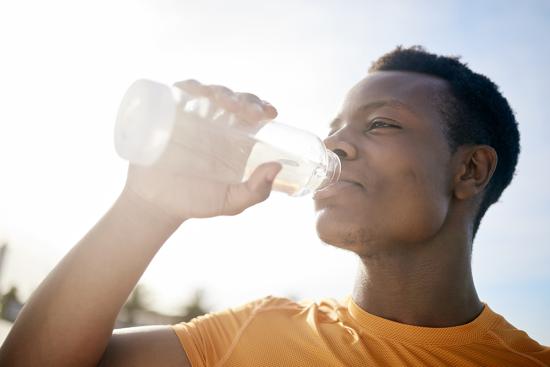
Water is vital to the life of every cell in our body. A recent study by the National Institutes of Health indicated that well-hydrated adults tend to be healthier and may even live longer than those who do not consume enough fluids regularly.
In the summertime, we tend to enjoy being outdoors in the warmer temperatures. It is important to stay hydrated while enjoying the warmer day. When our body is dehydrated, it doesn’t have enough fluid and electrolytes to work properly. Electrolytes are minerals in your body like sodium, calcium and potassium. They are found in foods you eat and the fluids you drink.
Water has many other functions in our body:
- Water helps the body facilitate many important functions such as circulation, absorption, transportation of nutrients, regulation of body temperature and the production of saliva.
- Water helps your kidneys flush waste and toxins through urination.
- Water helps lubricate joints and acts as a shock absorber for the brain and spinal cord.
- Water allows cells to grow, reproduce and survive.
Most experts recommend adults drink eight glasses of water (8 ounces each) each day (8 by 8 rule). However, not everyone meets this recommendation. Hydration recommendations change based on age, activity level, medication use, and body weight. Another way to calculate your needs is:
If Not Exercising:
Body Weight (lbs) / 2 = Intake in fluid ounces
If Exercising:
Body Weight (lbs) / 2+ water lost = Intake in fluid ounces
To determine water lost, weigh yourself before and after exercising
Replenish when you sweat. Do you play a sport or a hike in the woods? It’s essential to drink water throughout these activities. Your sweat rate, the humidity and how long you’ve exercised are all factors to consider. Proper hydration means getting enough water before, during and after exercise. The American Council on Exercise recommends these guidelines before, during and after a workout:
Drink 17-20 oz. two to three hours before you exercise.
Drink 8 oz. 20-30 minutes before you exercise.
Drink 7-10 oz. every 10-20 minutes during exercise.
Drink 8 oz. no more than 30 minutes after exercise.
Avoid alcohol, sugary drinks, and/or caffeine: Some liquids work against hydration! Drinks like coffee, sugary sodas, beer, wine and hard liquor, lemonade, sweet tea, energy drinks, smoothies and flavored milk are all culprits. They are loaded with sugar, sodium and other ingredients that remove water from your tissues. Consider swapping some of these out daily or rehydrating with more water for each dehydrating drink you consume.
Hydration is not just about what you drink; what you eat also provides hydration.
- Eat more "water-rich" fruits and vegetables like watermelon, strawberries, grapefruit, peaches and cantaloupe. Other good options include cucumbers, lettuce, zucchini, celery and tomatoes.
- Eat cold soups, preferably those that are broth-based. Gazpacho is one popular cold soup that originated from Spain. The main ingredients are tomatoes, bell peppers, cucumbers, garlic and onions.
- Choose coconut water over fruit juice. Coconut water generally has fewer calories and added sugars than fruit juice. It's also a good source of potassium.
*If you have questions or concerns about personal hydration recommendations, please consult your physician.
For more tips and support with health and wellness goals, sign up for individual health coaching. Contact us at healthcoach.osuhealthplan@osumc.edu to schedule a call.
Include in your message:
- A few dates and times you’re available for your first call (Monday-Thursday 7:00 a.m. to 7:30 p.m. and Fridays 8:00 a.m. to 5:00 p.m.).
- The best phone number to contact you.
- The best email to send scheduling reminders.
image credit: istockphoto
